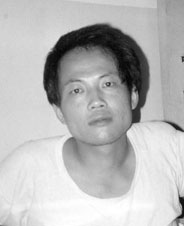
Photo by Maghiel van Crevel
_______
More poems and contributor notes in Chinese feature
_______
Maghiel van Crevel's translation of "The Program" first appeared in HEAT #5 (1997)
_______

Sun Wenbo
The Program
1
Leafing through the beautifully printed program, you see
a fiction of night: moon like a face ravaged by cholera.
He's sitting on a stone bench in the garden. Grief over the loss of his father
stirs his soul as cheap liquor would. You see
his depressed stare at the withered chrysanthemum.
When the orchestra strikes up, he starts walking
back and forth on stage. He sees you. You and he know what it means
to define positions for the actors and the audience: confusion.
2
With one step, with just one step, you have crossed the audience's
line. You have even seized the main character's role.
You have taken his position now, and started on a path
of revenge. You know better than he who the enemy is,
you would almost madly shout the enemy's name. You,
brandishing the sword that was once his, dash toward
the high point of the stage. You are directing the extras, you want them
to bring the enemy before you, you want to chop off his head right there.
3
Does he tolerate your behavior? He seems so dejected!
He has quietly withdrawn to a corner of the stage, his hands
restlessly tugging the edge of the curtain. What about the rest of the plot,
how should it be handled? How will a larger scene
combine with this scene to form a full-fledged act? He
doesn't know now. How can the time of two hours
be whiled away in only half an hour? And there should be
schemes yet, and conspiracies, betrayal — and someone's love.
4
Thereupon, time quivers in the crowd's eyes: clouds
rush like mad dogs over the crowd's heads; the river
falls, revealing glossy cobbles; bats at dusk
swoop to and fro 'round humming electricity lines.
Thereupon, you start stating details from a book:
downcast, retroflex sounds in a sentence
read out loud. They turn into a play within a play,
on death, on narrative come back to life from death. Thereupon,
5
the crowd sees a shocking episode: in a busy
streetcorner inn, a bunch of blind-drunken soldiers
are loudly talking smut. Two of them get into a quarrel
over comments made about a woman. This leads to
knives being drawn, to the inn being smashed up as they fight.
In this madness, all those present lunge into tangled warfare. And
someone dies. Just how satisfying is this smell of blood?
The audience is watching, wide-eyed and trembling with fear.
6
And the sentimental are now sobbing. And a woman
bereft of her man has now fainted in her seat. Time seems
to glide to one side now. You seem to walk into another life now.
“This daytime city — let it vanish like froth, let it
rise, let it rise. But not rise like steam, no,
rise like a rocket, screaming and in flames.”
You are satisfied with those sobbing. As for the one that fainted,
her you curse: you frail soul, what good is it that you exist?
7
Well what about him? He has left, in a gloomy state of mind. He
has entered an out-of-the-way side street of reality. Under pale yellow
streetlights, he walks with lowered head. The wind makes
noises high above, like a thief lifting up a roof. He
knows that to quit now means to quit forever. How
could one spend a lifetime inside a play? Wine on stage
will not resemble wine for long. As he turns and strides into
a small wineshop, he shouts: waiter, bring out the wine.
8
But you are drunk with being on stage. You're like the crown prince
who sees the throne unoccupied. At this moment, what your eyes
see is a scene sweeter than paradise: all of the
extras are like stage props in your hand. You fiddle
with them, as if fiddling with pencils. Chairs and tables talking?
You make the chairs and tables talk. Can walls and trees
walk about? You make them look like leopards on stage, and
walk about. “The stage in its greatness is a gorgeous dream.”
9
But — how will you make the final curtain fall? One climax
after another has failed to warm the hearts of the audience,
and pushed you to the center of excitement instead. In their eyes,
all you see is the glint and flash of knives and swords. The music
keeps working to construct a splendid paradise. Desire, swollen
like bread, makes you reach out your hand time and again. You
have forgotten yourself and forgotten him. You have become
a usurper. You now think that whatever you lay hands on is real.
Translated by Maghiel Van Crevel
